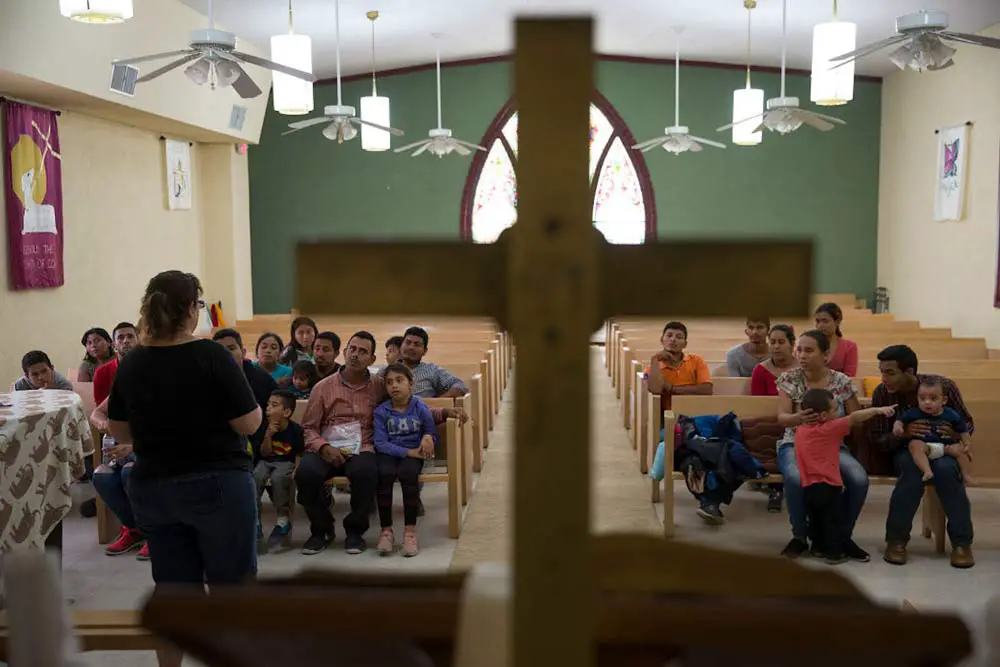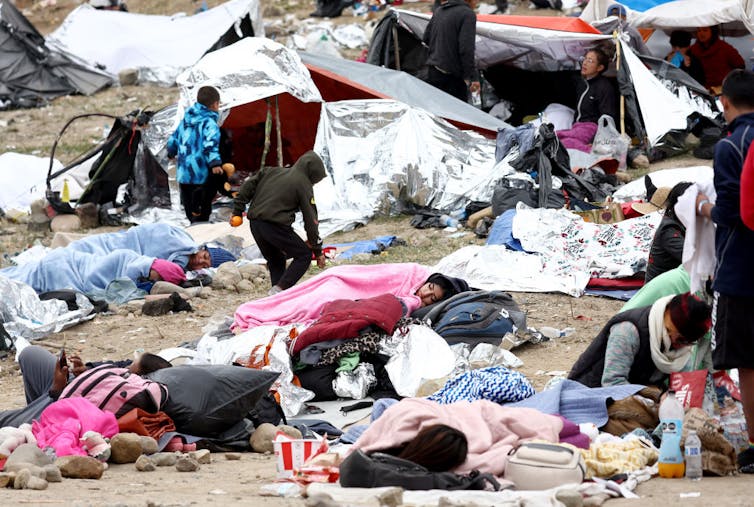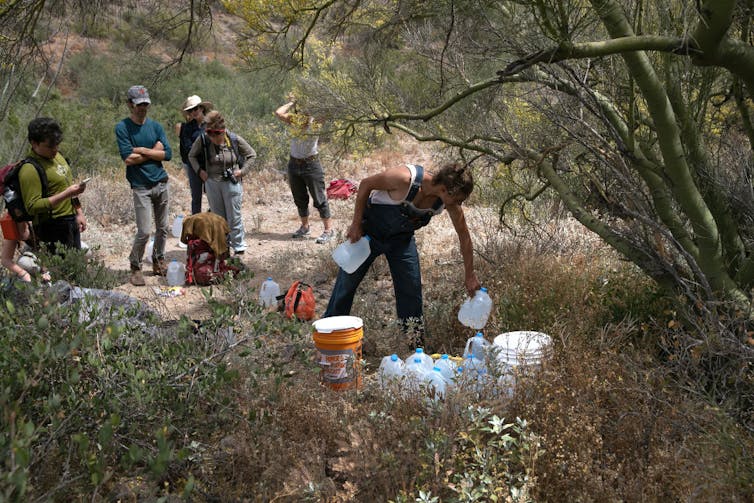
By Laura E. Alexander
Many religious traditions preach the need to care for strangers. But what happens when caring for the stranger comes into conflict with government policy?
After Title 42 restrictions at the U.S. border ended on May 11, 2023, debates about immigration have heated up again – focused mostly on reform, border security or refugees’ needs.
But the treatment of immigrants is deeply intertwined with religious freedom as well. As a scholar of religious ethics who studies immigration, I am interested in recent cases that highlight growing tensions between immigration policies and religious groups’ commitments to pastoral and humanitarian care.
Ministry at the border
One high-profile example centers on Rev. Kaji Douša, senior pastor at Park Avenue Christian Church in New York City, who traveled to Tijuana, Mexico, in 2018 to provide pastoral care to asylum seekers.
Her work was flagged by Customs and Border Protection after a Honduran woman allegedly said that Douša told migrants that marrying each other would make it easier to receive legal papers in the U.S. As Douša later testified, she did perform religious ceremonies, but only for couples who were already in common-law marriages and without claiming to provide any legal status.
Douša’s name and photo were added to a Department of Homeland Security watch list that included lawyers, journalists and activists, and she was detained and questioned by CBP officers upon her return to the U.S. A CBP official also sent an email to Mexican authorities asking them to ban Douša from entering Mexico because she lacked proper documentation – which the official later acknowledged had no basis in fact.
Douša filed a lawsuit accusing DHS of unjust surveillance and retaliation, and in March 2023 a federal judge ruled in her favor. Judge Todd Robinson agreed that DHS had violated Douša’s right to freedom of religious expression by instructing Mexican authorities to detain her.
Both Douša and the United Church of Christ, which ordained her, argued that her actions were based in her religious commitments. Douša previously stated, “To reject a migrant is to cast away God’s angels, which I am unwilling to do.”

Mario Tama/Getty Images
Shifts in the legal landscape
This is not the first time religious leaders or groups providing pastoral and humanitarian care to migrants have come under scrutiny.
One famous example is the Sanctuary Movement of the 1980s, an informal network of up to 500 churches whose members provided safe haven to undocumented asylum seekers fleeing violence in Central America.
Several members of the movement were convicted of conspiring to smuggle immigrants into the U.S. They appealed, arguing that their work was inspired by their religious convictions and that the government was violating their First Amendment rights. Yet their claims were largely unsuccessful.
Over the past few decades, however, religious freedom claims have often found more favor in U.S. courts.
In part, this is because of the 1993 Religious Freedom Restoration Act, which has made it easier for people and institutions to claim religiously based exemptions from generally applicable laws. One of the best-known examples is the 2014 Supreme Court case Burwell v. Hobby Lobby, in which the court, citing the owners’ religious convictions, exempted the national chain of crafts stores from providing employee health insurance that included contraception coverage.
Help on the ground
This shift has opened new lines of defense for religious actors, including humanitarian groups.
No More Deaths is a nonprofit associated with a Unitarian Universalist church in Tucson, Arizona. Members leave supplies along desert routes traveled by migrants, provide first aid and occasionally offer services such as temporary shelter to migrants who are suffering from exposure.
In 2018, volunteers were charged with littering, driving on protected lands and, in one case, harboring undocumented immigrants.

John Moore/Getty Images
Four volunteers were initially convicted, but their charges were dismissed after they argued that they were compelled by religious convictions and that the government had violated their freedom of religious expression. The appeals court judge cited the Religious Freedom Restoration Act as well as the Hobby Lobby case in holding that the volunteers were protected under U.S. law.
A more recent dustup between a religious humanitarian organization and government officials occurred in December 2022. A group of Republicans in Congress sent a letter to Catholic Charities, a humanitarian nonprofit affiliated with the church that provides food, shelter and bathing facilities on both sides of the border.
In U.S. border cities, the organization also provides transportation from shelters to bus stops and money exchanges. The representatives’ letter cited this work as a reason to suspect Catholic Charities of encouraging illegal border crossings and required staff to preserve records of their work.
The organization argued that the charges were “both fallacious and factually inaccurate.” Caring for people in need, “including vulnerable people on the move,” leaders wrote, “is a part of the fabric of the global Catholic Church and is mandated by the gospel.”
Yet another sticking point between religious groups and immigration law has emerged in Florida in recent weeks. A bill recently signed into law by Gov. Ron DeSantis was modified after religious groups protested against its proposed criminal penalties for knowingly transporting or concealing an undocumented immigrant. Religious leaders argued that this would violate their religious freedom by preventing them from providing rides to religious services or from finding aid for people in need.
National vs. universal mandates
It is not surprising that these conflicts keep happening, considering the U.S. government’s and religious organizations’ different motivations around migration.
One main driver for politicians is simply that many voters are nervous about newcomers, especially if they have different cultural, religious or racial backgrounds. The nonprofit Public Religion Research Institute has found that while 55% of Americans think immigrants strengthen American society, 40% believe a growing number of newcomers “threatens traditional American customs and values.” In the past few years, multiple Republican politicians have even embraced some version of the “great replacement” conspiracy theory. Once limited to extremist and antisemitic groups, replacement theory alleges that immigrants are either replacing native-born American citizens or are intentionally being used to facilitate electoral and social change.
Political scientist Seyla Benhabib has argued that another reason some leaders focus on border policies is that national sovereignty has been weakened in a globalizing world. Multinational corporations, for example, are sometimes influential enough to shape government policies, such as lobbying for weaker labor laws and environmental protections.
But whereas sovereignty and citizens are priorities for governments, many religious traditions teach adherents to care for people regardless of what community they belong to. Religious thinkers do argue over whether their traditions encourage greater attention to people in their own communities. Still, when it comes to people’s most basic survival needs, most emphasize that care should know no borders.
For the foreseeable future, these priorities will continue to clash – and some religious people may push back by claiming a First Amendment right to freedom of religious expression.
![]()
Laura E. Alexander is Associate Professor of Religious Studies and Goldstein Family Community Chair in Human Rights at the University of Nebraska Omaha.





























DaleL says
It is a crime to enter or attempt to enter the United States at any time or place other than one designated by U.S. immigration officers (Official border inspection points). For the first improper entry offense, the person can be fined (as a criminal penalty), or imprisoned for up to six months, or both.
For a repeat offense, the person can be fined or imprisoned for up to two years, or both.
In addition there are civil penalties.
More than 10 million “undocumented” (illegal) immigrants work (live) in the USA. Because they use false documents or none at all, they are either paid in cash or their wages are associated with false SS numbers. This means that either they pay no income taxes (cash) or their SS and Medicare withholding is not associated to them. They have difficulty legally banking, obtaining drivers licenses, and insurance. Eventually, when either elderly or injured, they have no social security or medicare benefits. People who “help” immigrants cross into the USA by illegal means are compounding the problem.
The Congress needs to pass comprehensive immigration reform. Congress must also adequately fund immigration and border security. Undocumented (illegal) immigrants need to be, on a case by case basis, be either deported or given a path to citizenship.
Ray W. says
One of the many powers delegated upon its creation to the Department of Homeland Security pertains to the assessment of how many undocumented immigrants reside in the United States. The following are published DHS assessments:
In 2005, 10.5 million, or 3.5% of the overall population.
In 2010, 11.6 million, or 3.8% of the overall population.
In 2015, 11 million, 0r 3.4% of the overall population.
In 2016, 10.7 million, or 3.3% of the overall population.
In 2017, 11.4 million, or 3.5% of the overall population.
In 2018, 11.4 million, or 3.5% of the overall population.
In 2019, 11.48 million, or 3.5% of the overall population.
No assessment was published for 2020.
In 2021, 10.22 million, or 3.1% of the overall population.
In 2022, 11.5 million, or 3.5% of the overall population.
I, too, argue for immigration reform, including funds for security and better processes for undocumented immigrants; it might prove wise.
I do not agree with those who agitate against undocumented residential immigrants, as if the issue qualifies as a great problem. I see the issue as a problem, but not as a great problem. To me, famine, war, pestilence (pandemics), slavery, these are great problems. While I admit that many sayings attributed to President Lincoln may not have actually been uttered by him, I have read that he is said to have commented that all great problems are unsolvable. If a problem can be solved, according to Lincoln, it does not qualify as a great problem. Wise words to consider, whoever uttered them.
If the DHS assessments are accurate, is it reasonable to argue that the number of undocumented residential immigrants is a stable problem, however bad it might be? That it is the type of problem that can be mitigated by more comprehensive legislation? That every presidential administration since 2005 has experienced a similar level of problem, regardless of policies, either claimed or actual? That the gullible among us can be far too easily agitated by those who wish to provoke agitation for personal or political gain?
Tony Mack says
Maybe this will help —
In 2013, Democrats passed a bi-partisan immigration reform bill in the Senate;
House Republicans refused to allow the bill to be debated;
President Obama asked Republicans to propose their own immigration legislation
Republicans refused to propose any legislation;
Then Republicans demanded Obama do something about illegal immigration;
Obama used his Executive Authority to enact immigration reforms;
Republicans were outraged and called President Obama a tyrant for doing exactly what they asked him to do.
Republicans don’t want any actual reform of immigration because it takes away a key issue they use to beat up Democrats and rile their base. And it works!
Anti- hate says
Ever hear the story of Anne Frank? Did you read(or watch for those Rs that can’t read) and go we should do that here? It was illegal to aid or assist her. Ron is a full blown racist just like ol Adolf. If you support this evil than you should be treated as such and labeled Nazi for your remaining days.
Sherry says
Thant you anti-hate.. . . an excellent comparison!
Sherry says
I’m a very spiritual person. Even though I am not bound to any organized religion, I want to ask all Christians. . . what would Jesus do? Jesus loved, showed mercy to, and forgave the sinners and those shunned by society. Should our religious leaders completely forsake the teachings of a merciful God? Should our religious leaders stop all charitable and supportive acts to those people among us who need them the most?
Does Christianity now only include those who are without sin? Should religious leaders now be arrested for giving comfort to those who are merely striving to save their own lives ? These are indeed extremely troubling times!!!